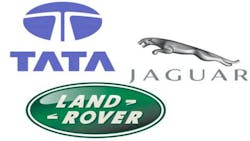NEW DELHI -- Tata Motors (IW 1000/150) said Friday that a stellar performance by its marque Jaguar Land Rover offset a dive in domestic sales, pushing net profit up by 71%.
The country's leading automotive group has become heavily reliant on revenues from JLR which it bought for $2.3 billion from Ford in 2008 at the height of the global financial crisis.
The purchase, seen by auto analysts at the time as a risky gamble for the Indian company, has paid off dramatically with the iconic luxury brands accounting for most of Tata Motors' profit.
The vehicle giant, which also makes the low-cost Nano hatchback, reported consolidated second-quarter net profit climbed to 35.42 billion rupees (US$558 million) from 20.75 billion rupees a year earlier.
Jaguar Land Rover's after-tax profit for the three months to September soared by 66.2% to 507 million pounds (US$811 million).
"The weak operating environment in the India business was more than offset by the increase in wholesale volumes and richer product and market mix at Jaguar Land Rover," the company said.
The profit increase was the first in four financial quarters posted by Tata Motors and outstripped market consensus forecasts of around 25 billion rupees.
Total revenues of Tata Motors, part of the giant steel-to-software Tata Group, jumped 31% to 568.82 billion rupees.
Jaguar Land Rover's sales climbed an overall 21% to 102,644 units in the quarter, according to the statement.
Jaguar deliveries rose 56.5% to 20,024 units. Land Rover sales increased 14.8 percent to 82,620 vehicles.
JLR's strong performance has been driven by a slew of new launches and sturdy demand from China.
But in India, the economy has been growing at a decade low of 5%, putting the brakes on the once-red hot domestic car and commercial vehicle market.
High borrowing costs, worries over a sharp slowdown in the economy and costly fuel prices have kept car buyers out of showrooms and sharply reduced demand for trucks, hitting Tata's domestic revenues.
Tata Motors' India operations swung to a net loss of 8.04 billion rupees in the second quarter compared with a net profit of 8.67 billion rupees in the same period a year earlier while sales slumped 29 percent to 8.76 billion rupees.
The company blamed the slowdown in economic activity and a "tight financing environment" for the poor performance.
Sales of the Nano have badly disappointed the company. It hoped the compact it launched for what was around $2,000 in 2008 would be a hit. But consumers spurned the vehicle, feeling embarrassed to be driving what was dubbed "the world's cheapest car", and Tata now plans to take the egg-shaped car more upmarket.
- Penelope Macrae, AFP
Copyright Agence France-Presse, 2013
About the Author
Agence France-Presse
Copyright Agence France-Presse, 2002-2025. AFP text, photos, graphics and logos shall not be reproduced, published, broadcast, rewritten for broadcast or publication or redistributed directly or indirectly in any medium. AFP shall not be held liable for any delays, inaccuracies, errors or omissions in any AFP content, or for any actions taken in consequence.
